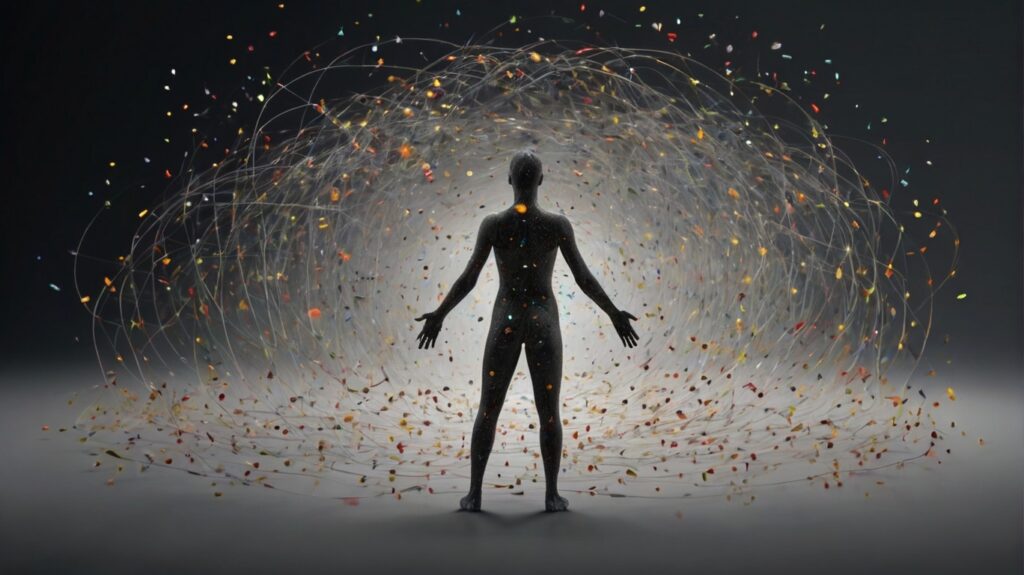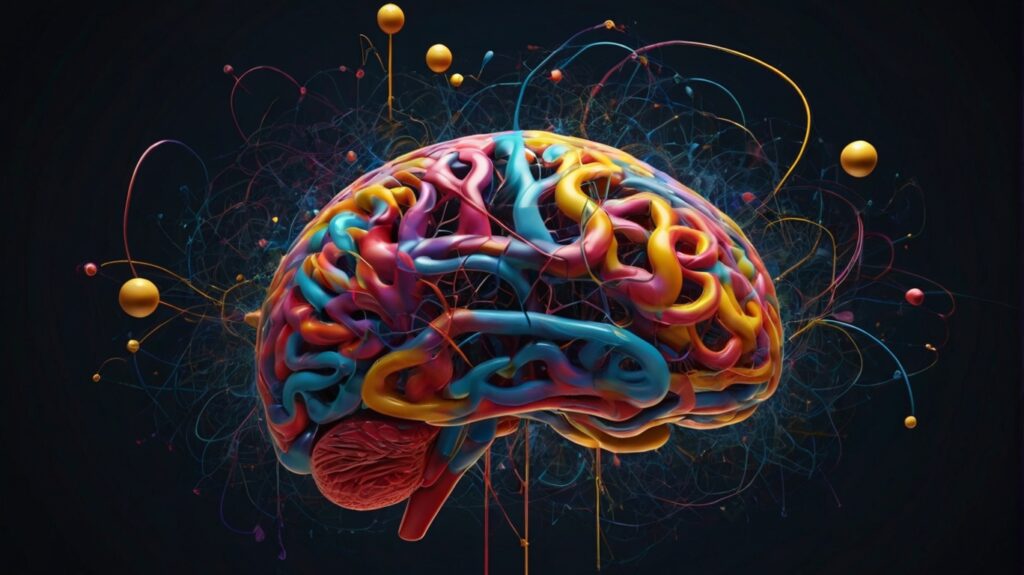Like the enigmatic origins of life, the emergence of consciousness, the dawn of self-reflection, and the sensation of free will also do not coincide with a precise moment in history. However, archaeological evidence indicates that as early as one hundred thousand years ago, or possibly before, our ancestors began to manifest experiences indicative of consciousness. Early humans had already adopted an upright stance, a significant milestone in human evolution. Following this, they began to exercise their will, leading us to ponder the extent of their freedom in doing so.
The Enigma of Free Will
Rarely do we find ourselves marveling at the intricate workings of our pancreas in producing chymotrypsin or the complex operations of the trigeminal network that triggers a sneeze. Our autonomic processes proceed without our conscious investment. When contemplating our identity, we use the thoughts, sensations, and memories accessible through introspection and internal dialogue. Although the physiological functions, like the production of chymotrypsin and the reflex of sneezing, are universal among humans, it is in our feelings, thoughts, and actions where we seek the essence of our individuality. This search is underpinned by a widely held, yet seldom scrutinized, belief in our autonomous will — the notion that we are the architects of our actions, independent and self-governing.
This perennial question of free will has engendered vast philosophical discourse, rivaling most other existential puzzles in the literature it has inspired. Two millennia ago, Democritus presented a universe composed of atoms and the void, an early vision of a unified natural order devoid of the unpredictable interventions of deities, laying the groundwork for a deterministic universe. Yet, this deterministic view leaves us pondering the existence of free will. Is there space for genuinely autonomous actions within a framework dominated by divine decree or unyielding physical laws?

Epicurus, emerging a century after Democritus and eschewing divine meddling, lamented that the deterministic nature of scientific understanding threatened the very concept of free will. He argued that if divine entities were in control, their favor might be won through devout worship, potentially earning us a measure of freedom. However, the impersonal nature of natural laws, indifferent to human appeal, offers no such negotiation. To reconcile free will with determinism, Epicurus suggested that atoms might occasionally deviate from their expected paths in a spontaneous swerve, introducing unpredictability and the possibility of a future not preordained by the past. Although innovative, this solution, which arbitrarily injected chance into the deterministic universe, did not convince everyone of its viability as a foundation for human freedom.
Throughout the centuries since then, the enigma of free will has captivated the minds of a host of eminent thinkers, including Saint Augustine, Thomas Aquinas, Thomas Hobbes, Gottfried Leibniz, David Hume, Immanuel Kant, and John Locke, among others. This lineage extends to contemporary philosophers and scholars worldwide, who continue to grapple with the dilemma. The debate over free will, straddling the realms of divine influence, deterministic natural laws, and the potential for randomness, remains a central theme in philosophical inquiry, illustrating humanity’s enduring quest to understand the nature of our autonomy and the true source of our actions.
Steering the Maze of Determinism and Autonomy
In the modern discourse on free will, a paradox emerges that challenges the very notion of our autonomy. Our experiences seem to affirm that we shape the course of reality through our actions, driven by freely chosen thoughts, desires, and decisions. However, from a physicalist perspective, we are merely assemblies of particles, bound by the unyielding laws of physics. Our choices and actions, then, are the outcomes of these particles’ paths through our brains and bodies. Every motion, from the cerebral to the mundane, is preordained by physics, leaving no room for free will to operate outside these deterministic confines. Tracing this deterministic chain back to the big bang suggests that all matter, including us, is subject to a cosmic script written by the immutable laws of physics, undermining our sense of autonomy and reducing us to mere cogs in the universe’s grand machinery.
This perspective leads to the pressing question: Can we reconcile the apparent erosion of free will with the deterministic nature of particle motion? Some thinkers challenge the reductionist view, proposing that the complex arrangement of particles in the human body and brain might escape the strict governance of fundamental physical laws. This hypothesis suggests that at the macroscopic level, phenomena like free will could emerge, phenomena that microscopic laws would otherwise prohibit.

Yet, despite the theoretical possibility that human complexity could transcend basic physical laws, there is no empirical evidence to suggest that the laws governing the universe allow for any exceptions. The mathematical complexity of predicting the behavior of particles within a human being surpasses our current computational capabilities, focusing the debate not on predicting individual actions but on the existence of laws that dictate these actions. Although the collective behavior of vast numbers of particles can result in complex and unpredictable phenomena, all indications point to these phenomena still being fundamentally governed by physical laws. The possibility that the rules governing life and consciousness differ from those governing inanimate matter remains speculative, with current scientific understanding affirming the pervasive influence of physical laws.
Quantum Uncertainty and the Myth of Free Will

In the quest to reconcile free will with the deterministic nature of the universe, many scholars have turned to quantum mechanics for answers. Classical physics, epitomized by Newton’s laws, claims a universe where the future is a direct continuation of the past, determined by the precise state of particles at any given moment. This deterministic framework leaves little room for free will, as it suggests that the state of our particles today, and thus our thoughts and actions, were predestined long before our birth.
Quantum mechanics, however, introduces a paradigm shift. It replaces classical physics’ certainty with a probabilistic model, where Schrödinger’s equation provides a spectrum of potential futures, each with its likelihood, instead of a singular, deterministic outcome. This shift from a definitive future to a range of possible outcomes has sparked discussions on whether quantum mechanics could accommodate free will within its probabilistic bounds.

Yet, the allure of quantum mechanics as a haven for free will is misleading. Despite its probabilistic nature, quantum mechanics does not equate to the freedom of choice. The theory itself delineates a predetermined set of probabilities for future states; it does not grant the ability to choose among these states. For instance, quantum mechanics may predict that an electron has equal chances of being in two different locations, but the outcome of its position upon observation is random. This randomness, devoid of personal choice or influence, underscores that even within quantum mechanics, outcomes are not manifestations of free will but of statistical regularity. The distinction between classical determinism and quantum probability might influence our understanding of reality and the predictability of scientific phenomena, but it does not alter the conclusion regarding free will. Regardless of whether the laws of physics are deterministic or probabilistic, they operate without pause, shaping the universe and everything within it, including human actions and thoughts, without any need for human intervention.
We perceive our choices as free because we are not privy to the fundamental operations of nature’s laws at the particle level. Our senses and cognitive processes are attuned to the macroscopic scale of human experience, where our deliberations, decisions, and actions feel autonomous. However, if we could perceive and understand the world at the level of its most basic constituents, we would see that our thoughts and behaviors are the results of complex particle interactions, orchestrated by the immutable laws of physics. This realization does not diminish the richness of human experience but rather places it within the grand scheme of the physical universe, bound by its laws.
Human Autonomy and Physical Laws

In the quest to understand free will, it’s educating to shift our perspective from a narrow fixation on ultimate causality to a wider examination of human capability. Our liberation does not lie in escaping the immutable physical laws that are beyond our influence. Rather, our freedom manifests through the unique array of behaviors—such as walking, thinking, dancing, observing, and speaking—that distinguish us from the inanimate and simpler forms of life. This conception of human freedom transcends the traditional debate on volitional choice. The cumulative evidence from scientific inquiry reinforces the conclusion that the capacity for voluntary intervention in the course of events is a fiction. Instead, our freedom should be viewed as emancipation from the limited repertoire of actions that characterizes the non-living world.
The essence of freedom does not hinge on the existence of free will. Employing the term “free” to describe actions that, according to physical laws, are not the product of willful choice might appear misleading. However, as advocated by the compatibilist philosophy, this perspective does not render the relationship between freedom and physics hopeless. Recognizing different manifestations of freedom that are consistent with the constraints of physical laws offers significant value. True freedom, then, is about breaking away from a constrained set of possible actions. This understanding of freedom brings me considerable solace. As I engage in writing my thoughts, the awareness that my cognitive and physical activities are just the manifestation of fundamental physical laws outside my dominion does not perturb me. What is significant is that, in contrast to inanimate objects like tables or glasses, the collection of particles that constitutes “me” is capable of a remarkably broad spectrum of actions. The awareness that the arrangement of my particles results in the creation of this text does not lessen the genuineness of my satisfaction in their activity. My sense of freedom stems not from an ability to override physical laws, but from the intricate internal organization that liberates my range of behaviors.
The Paradox of Agency
The relinquishment of traditional notions of free will might appear as a surrender of much that we hold dear. If the framework of reality, inclusive of conscious beings, is preordained by physical laws, then what significance do our actions hold? Is there merit in personal effort, or should we resign ourselves to the inexorable march of physics? Amidst this deterministic framework, does the concept of individuality retain any meaning? Moreover, how can cherished human capacities such as learning and innovation find relevance?
Acknowledging that both you and I are assemblages of particles offers a foundational yet incomplete understanding. Indeed, it aligns us with the universal fabric of matter, subject to the same fundamental laws. However, the narrative of human experience, rich with thought, struggle, achievement, and failure, operates at a level that transcends mere particle arrangements. This narrative, while grounded in our physical composition, brings to light the profound intricacies of daily existence, offering insights that particle physics alone cannot illuminate.
Within these narratives, we assign value to our actions, impacts to our choices, and weight to our decisions. Do such considerations hold water in a universe driven by unyielding physical laws? Absolutely. Physics may challenge the common belief that we are the sovereign authors of our choices, underscoring that our decisions and actions, though bound by physical law, are integral to the causal continuum of the universe. Our thoughts and actions, preordained by preceding events and governed by the laws of physics, are nonetheless consequential, serving as vital links in the unfolding of reality.
Responsibility, too, finds its place in this deterministic context. Even as my behaviors are dictated by the laws governing my particles, I embody a unique configuration of these particles at any moment, making me synonymous with my actions. This perspective does not negate the influence of physical laws but emphasizes that my unique particle arrangement—comprising a complex network of genes, proteins, cells, and neurons—acts in a manner distinctly mine. Our individual differences in speech, action, and thought stem from our divergent particle configurations. As my arrangement of particles engages with the world, learning, thinking, and interacting, it asserts my individuality and affixes my responsibility to each action I undertake, illustrating that within the constraints of physical determinism, human agency and individuality flourish in their own right.
Reconciling Human Freedom with the Laws of Physics
The remarkable diversity of human responses serves as a testament to the fundamental principles of entropy and natural selection. Entropy elucidates the emergence of orderly systems within an increasingly chaotic universe, exemplifying how stars can form and maintain stability while radiating energy across eons. Natural selection, on the other hand, outlines the journey of particle assemblies on planets like ours, warmed by stellar energy, evolving complex behaviors from replication and metabolic processes to cognitive abilities such as thought, communication, and cooperation. These abilities, honed over generations, ensure the survival and proliferation of such assemblies, despite a common misperception among them that their cognitive prowess might somehow override the laws of physics.
This misperception leads to the illusion of a conflict between the felt experience of free will and the immutable control exerted by physical laws—a conflict that, in reality, does not exist. The key lies in shifting our focus from the laws governing particles to the rich and complex behaviors these particle assemblies—individual humans—can exhibit. This perspective allows us to appreciate a narrative of existence that marries the sensation of free will with the deterministic nature of physics, illuminating a world of behaviors and experiences that feel autonomously controlled yet are fully congruent with physical law.
Intellectually, the arguments presented in this essay may resonate, yet they do not dispel the visceral feeling of control over one’s thoughts and actions. This feeling largely stems from its familiarity, a notion that can be profoundly altered, as evidenced by those who have experienced shifts in perception through mind-altering substances. Such experiences reveal how altering the brain’s chemical composition can change our sense of self, our perceived abilities, and the illusion of free will—all emerging from the intricate dance of particles within our brains.
In daily life, references to free will permeate our language and experiences—we speak of choices, decisions, and their consequential actions, embedding these concepts in a narrative that feels intensely real. This discussion does not render such descriptions meaningless but calls for a refinement of our language and assumptions. It challenges us to acknowledge that our decisions and actions, while felt as originating from an independent agency, are in fact bound by the laws of physics that govern all matter. Recognizing the sensation of free will as real, yet acknowledging the impossibility of transcending physical laws, allows us to reinterpret human freedom. By shifting our focus from the notion of an autonomous origin to the breadth of behaviors we are capable of, we can embrace a profound and unbounded form of freedom that aligns our human experiences with the fundamental realities of the physical world.
Conclusion
In the scheme of existence, where the laws of physics govern every motion and thought, the quest for understanding free will confronts us with profound questions about our place in the universe. This essay has traversed the realms of determinism, quantum uncertainty, and the essence of human autonomy, challenging the traditional notions of free will while exploring the depth of human agency within the unyielding framework of physical laws.
Our journey through these concepts reveals that the true essence of human freedom does not lie in the illusory dominion over the laws of nature but in the remarkable capacity for diverse actions and experiences. This nuanced perspective invites us to redefine freedom, not as the power to deviate from the deterministic or probabilistic paths laid out by physics, but as the richness of the human experience within these constraints.
The paradox of agency, set against the backdrop of deterministic physics, underscores a fundamental truth: while our actions may be preordained by the causal chain that precedes us, they carry significance. They are expressions of our unique particle configurations, embodying our individuality and responsibility. Our decisions, actions, and the paths we tread contribute to the unfolding narrative of the universe, each moment a testament to the complexity and wonder of human existence.
In reconciling human freedom with the laws of physics, we discover a freedom that is both profound and boundless. It is a freedom that celebrates the myriad behaviors and capabilities that distinguish us, allowing us to navigate, create, and transform our world within the parameters set by nature. This understanding does not diminish our sense of autonomy but enriches it, positioning our experiences and choices as integral components of the cosmic order.
As we stand at the confluence of determinism and autonomy, we are reminded of the beauty in the inevitability of existence. The sensation of control, the richness of our experiences, and the depth of our choices weave together a narrative that, while governed by physical laws, is uniquely human. In this narrative, we find not constraints but liberation—a liberation that comes from understanding our place in the universe, embracing the complexity of our actions, and recognizing the profound freedom that emerges from the intricate interplay of matter, energy, and consciousness.
Thus, as we navigate the complexities of life, let us cherish the freedom that arises from our unique human capacities. Let us celebrate the vast spectrum of actions and experiences available to us, recognizing that our true autonomy lies in the richness of these experiences, harmoniously intertwined with the fabric of the physical world. In this understanding, we find not only solace but a profound appreciation for the marvel that is human existence, free and bound in equal measure by the laws that govern all.







